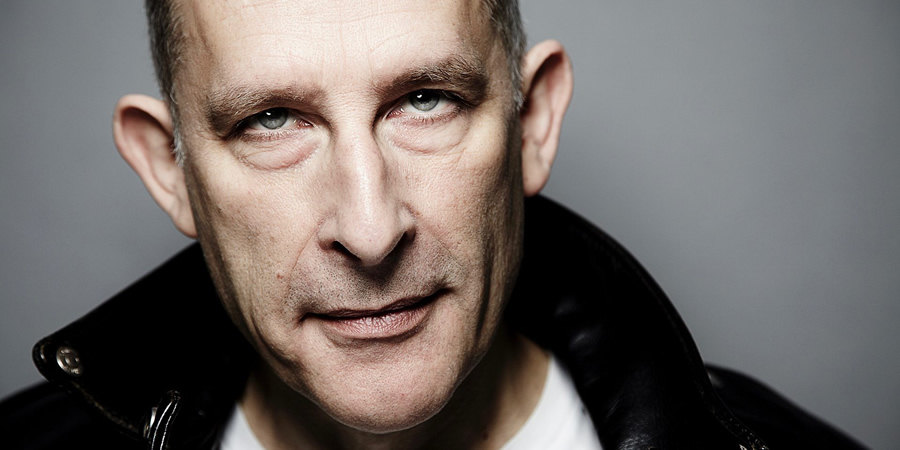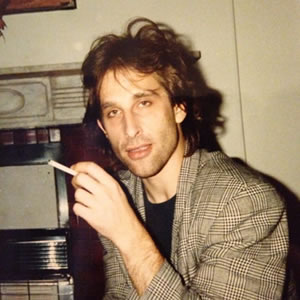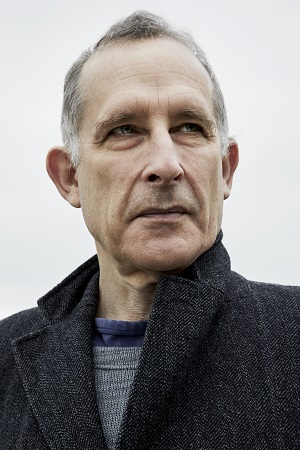
Circuit Training 127: Nick Revell still has The Write Stuff

When we started this here column just over ten years ago, the whole idea was to hassle comedians who'd endured an interesting back-and-forth between live comedy and the broadcast version, over the years.
So as Circuit Training heads into its second decade, it's high time we nail down Nick Revell, who is just about the perfect Circuit Training guest, after all. And we rattle through it: his early days at The Comedy Store (with The Comic Strip, and Robin Williams), a regrettable move away from the circuit, the broadcasting ups and downs - from frantic Drop The Dead Donkey gag-writing to the gone-too-soon Nick Revell Show - and an eventual return to live comedy, which proved tricky too.
We initially got chatting after Nick's preview show in Herts a few weeks back, and that new Fringe show - Eurasia's Most Eligible Psychopaths and Their Lovely Homes - is really quite extraordinary. As the name suggests, it's a pan-global travelogue/flight of fancy that only he could do, and probably only at this stage of his career, with all the freedom that bestows.
Then we carried on over the phone, just an hour or so before he was due to train it up to Edinburgh.

How's the pre-Fringe prep going?
Everything seems to be reasonably under control. I'm very methodical, which helps I suppose: I always think, if you're methodical about the stuff that has to be done, it leaves more space to be bonkers in my head for the work. I've got more organised the crazier my work's become really - I hadn't really thought of that before.
It was interesting seeing your preview - you seemed to be concentrating on the structure first, then would worry about the jokes later.
In Edinburgh it's really important to have it bang on the hour, so you have to be really rigorous. You time a few previews, then find out where the laughs are. Particularly this type of show, it's getting that balance between keeping the narrative going and letting them in to laugh - it's quite a delicate thing.
I pretty much do a word count and a page count - 'four pages have got to come out of this, whatever happens'. It's painful sometimes.
At least you haven't got a sub-editor cutting stuff - I've had it where they've left in a callback to an earlier thing that now doesn't exist.
Oh god - well, I worked on a sitcom once, and for various reasons they wouldn't let me and the other writer into the rehearsals. We went to the first table read and didn't see it again until the first dress rehearsal. Which is ridiculous.
And exactly that happened, they were saying 'we're trying to work out why that's not getting a laugh' and we didn't even need to look at each other. 'What you've done, you've taken out the line that sets them up.' They couldn't even see that.
So it happens in all forms. From a stand-up's point of view, you've always got an editor when you get it onstage.
How would you describe what this show actually is?
I suppose it's surreal satirical storytelling, that's the shortest way I can describe it. I try and create a world which is recognisable - but expanded and distorted - and reflects our own. How would I describe this one? I put quite a lot of implication into the title - hopefully it's intriguing. It's about me accidentally doing PR for a mad dictator.
What drew me into it, the way that spin and fake news are so crucial to politics, who controls the narrative controls the power - I wanted to explore that, but to avoid going into a full-frontal approach to all these big issues, trying to make them more fun.
I'm also really interested in the Silk Road, all the trade routes coming out of China, again. I always start off with lots of research in something I'm interested in, then hopefully a story will come out of that. I try to structure it like three acts of a movie, it gives you momentum.

I imagine your stuff was very different early on - how did you get started in stand-up?
I was doing sketch and review stuff at university and also selling a few gags to radio and TV, one-liners to Weekending and Not The Nine O'Clock News. Then when I left [uni] I went down to The Comedy Store.
I didn't really intend to be a stand-up, but I did a guest spot in 1980 and really struggled, because it was a real bearpit there - and in fact that night The Comic Strip people were struggling as well. But the bug had bitten, I saw a couple of people doing it really well and I thought 'wow, how do you get to that point?'
I was still writing sketches, was in a theatre company for a while, but in '81-82 I started to go down there more, started to get booked, paid... then I took 10 years off when I was just writing, which was silly really.
That does seem quite common, when other stuff takes over.
I was busy on other things: sitcoms, two novels, a play, a couple of solo shows which weren't entirely comic but certainly weren't stand-up.
Then I started doing stand-up again around 2002, I just decided I wanted to do it again, and pretty much had to relearn it. And in the last few years I've got more interested in trying to combine that kind of narrative with the style that I did in my books, onstage.
I know they're a bit bonkers, but I think it's quite accessible.
And unique...
I think so, and that's quite exciting. You learn more every time you do a new one.

So what were you doing early on - topical stuff?
Quite a lot of topical and satirical stuff, but obviously your first concern is having enough jokes to last for the time you're booked for. So you're watching [comedy] videos, listening to albums and thinking 'I need my version of that' - you're not stealing it but you're influenced by other people.
Then you start hopefully developing some sort of consistent sense of what your delivery and stage persona is, what kind of material you explore - but yeah, I always used to write a lot of topical stuff because it was a good way of turning material over, and I always think that's important.
Did it help, seeing The Comic Strip guys struggle, that first night?
Not in a malicious way, but it made you realise how difficult it is. This is before they were well known, and you could see they were good, it was just a very difficult audience.
I always think it's useful for new comics to watch big acts do a preview or new material night - it's a world away from the perfect TV stuff.
There's nothing like seeing a bit of failure round the edges to make a really good set actually. I often say about seeing Robin Williams at The Comedy Store.
He was going off on improv riff number one, number two - brilliant. Improv riff number three or four, he hit a dead end, the audience felt like 'that fell flat' so he went 'oh well, we'd better try something else then!' He was taking risks but ready to own it.
The other thing that was interesting, this was before he was famous really, when he was publicising Good Morning Vietnam: he'd done Mork and Mindy, and gradually a few people in the audience realised that's who it was, but he definitely wasn't famous to everybody in that room. It was interesting seeing him owning the failure - it just makes it more alive for me.
I reckon the audience is more relaxed if you fail and recover - I always prefer a goalkeeper who's made a big mistake and bounced back from it.
Exactly, that's a very good analogy, and strikers who have patches where they miss easy chances. Recovering from mistakes is one of the crucial things about high performance. Because you're always going to make them.

I really should have brought along my old tape of The Nick Revell Show...
I was really fond of that show: they run it quite a lot on [Radio] 4 Extra, and it's really nice how much feedback I get off that, because that's what, 25 years ago? It's a shame in a way that I didn't do another series, and it was my choice. But I had another thing that I wanted to do, which I was very happy with, but I wish I'd done another series of that.
What was the highest profile thing you did - Drop The Dead Donkey?
Probably, and that was great as well, a really good production to work on, run well from top to bottom, a camaraderie across the departments.
And again, quite unique, a quickly-written topical sitcom...
And that acted as a bonding mechanism, it wasn't just the writers delivering the script, we were in rehearsals, writing new stuff all the time, so it did bring everybody close together. There is something quite thrilling about that terrifying pressure, particularly coming up with the closing jokes that used to go over the credits.
The actors came in at two or three o'clock and you're there at 11, and, ok, it's only 25 seconds of dialogue, but fuck, you'd always have a big ball of adrenalin in your stomach - ohhh, got to get this right.
It sounds almost like the writers room for a big US talk show monologue, but for a sitcom.
And with a very short turnaround - they probably had all day. But it was quite exciting.
So did they do that stuff as audio over the credits because it would take too long otherwise, all the blocking etc?
Exactly, if you'd done it on film it would've taken way, way longer, whereas once you'd written the script then the production side of it, they'd read it a few times, put the track underneath it, all done in an hour or so.
Then you got back into stand-up - which must be tricky after years away?
Absolutely - going back to a footballing metaphor, it's like playing for Real Madrid 10 years after you last trained. You'll not be up to speed. So I knew that I'd have to start by doing every gig I could do, and just gradually get all the reflexes back.
It was horrible at the beginning, I'd be in situations where I'd be thinking 'I used to be able to deal with this' - now I'm tripping over my words, coming across as uncomfortable on stage. But that's the only way to do it.

Your ego is different then too - people know who you are...
Before I made the decision to start again I thought right, this is really going to hurt sometimes, I'll just have to accept it and not judge myself on every gig - which is virtually impossible to do. But pretty soon I was reasonable. Although by then people had seen me and probably thought 'what a tragic return!' It takes time to re-establish your reputation.
So the Fringe is coming - what do you do on the train up there?
I'll have my script, a book, I'll read the paper, and anything that occurs to me will go in the notebook. I've still got some rewrites and new gags to drop into the script. That's why I get the train, I can just sit there for four or five hours and just do some work. The phone'll be off so I'll be in a nice little bubble.
The Edinburgh period itself - it feels like a sportsman going into a new season.
It does - having the right perspective is crucial. I know the show is going to evolve over the weeks, and hopefully get enough word of mouth going that I can set up a little tour in the spring. That's my aim.
I don't tend to go on the lash much - I like catching up with people, having a few drinks, and I like to see a lot of other stuff while I'm up there.
I'm lucky with my accommodation, I stay with friends. One year I shared with John Sparkes...
Crikey, what was that like?
He's fine, he's pretty sensible really. But if you're in a group share, the circumstances are really ripe for collective neurosis and paranoia, you're constantly discussing your shows, reviews and audience numbers.
And what are you up to post-Fringe?
I'm writing a play with some students, and I'm doing a radio series next May; I've kind of written a few possible scripts for that. Then I want to get all of the writing out of the way before Christmas so I can start thinking about the new show.
It sounds like you've got a nice balance going now.
I try to. Of course you get mood swings, but that's good as well. It stops you being complacent.
Help us publish more great content by becoming a BCG Supporter. You'll be backing our mission to champion, celebrate and promote British comedy in all its forms: past, present and future.
We understand times are tough, but if you believe in the power of laughter we'd be honoured to have you join us. Advertising doesn't cover our costs, so every single donation matters and is put to good use. Thank you.
Love comedy? Find out more